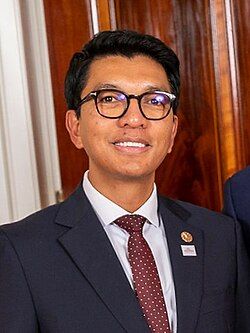
Madagascar’s President, Rajoelina pledges to address challenges in a year
Madagascar’s President Andry Rajoelina has pledged to address the country’s pressing challenges within a year promising resignation if issues persist. The declaration came during a town-hall style meeting at his palace attended by various government supporters where the president emphasized the importance of honest dialogue over flattery.
“I don’t want flattery. I want to hear the truth. It’s the people who kept telling me that everything was fine who are responsible for our current situation,” Rajoelina stated.
Meanwhile, the youth-led protest movement, Gen Z Mada continues to demand the president’s resignation. The group refused an invitation to participate in the talks citing ongoing repression and human rights abuses against their members. They have called for new protests scheduled for Thursday and issued a nationwide strike following a 48-hour ultimatum for Rajoelina to step down.
In a recent move, Rajoelina dismissed his entire government and appointed an army general as prime minister, a decision rejected by the protesters, who vowed to persist in their struggle. The unrest was initially sparked on September 25 by frustrations over power and water shortages but has since expanded to encompass broader grievances such as corruption, high unemployment, and the rising cost of living.
Despite the protests, daily life in Antananarivo largely continues normally though some neighborhoods with heavy police presence have seen roadblocks and patrols. Clashes between security forces and protesters have resulted in at least 22 deaths according to the United Nations, though authorities contest these figures.
Rajoelina has been holding these dialogues as part of his commitment to “listen more,” asserting that ongoing infrastructure projects, including an addition of 265 megawatts to the national power grid, will resolve the outages. He notably declared that if power cuts in the capital persist beyond a year, he would resign.
The political crisis reflects deep-seated frustrations among Madagascar’s youth and citizens, highlighting the ongoing struggle for accountability and basic human rights amid a challenging economic and social climate.
